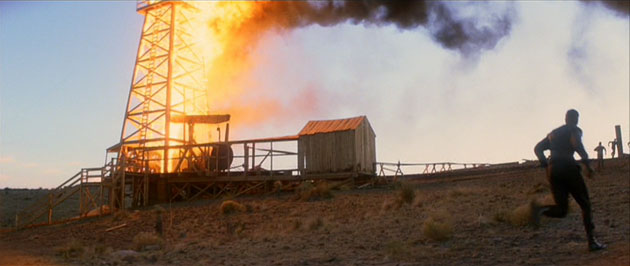Jack Fisk

But now my hopes are that the union becomes a place that has some way of raising the standards of everybody’s work. By having a knowledge-base that we can all pull from. A program where people can come in and apprentice and learn from the best. I’m hoping that the union can become an organization that makes us all better.
AS: What do you like most about production design?
JF: The thing I like about production design is the idea of illusion. The magic of it. We’re creating worlds that don’t exist. When I was a kid I saw a Little Rascals show on television. They’d built a fort and when you were outside the fort and looked across the fence you saw people marching by with guns. You go inside the fort and it’s these two little kids marching with a broken ladder. One rail was missing and the rungs of the ladder were sticking up so you thought it was a platoon of kids marching with guns. That image just stayed with me. I thought, That’s magical.
And having financial limitations makes us more creative. You need some sort of parameters or limitations to know how to work. I came up with that realization early on, working with Roger Corman. I was just thinking, If someone told you to create the most expensive, beautiful dining room that ever existed, where would you start? You start asking yourself, Would they have gold inlay? Marble floors? What kind of molding would they have? But then if they said, Build it for $50,000 suddenly it’s easy. Because you know what you can do with that amount of money. If they said, build it for $5,000 it becomes difficult and easy in another way. Scripts and budgets set up the parameters for our imagination to start working because without some guidelines we might just sit and fantasize forever.
AS: Fellini said once that if he didn’t have a producer telling him what he couldn’t do, he would never do anything.
JF: I love for people to say you can’t do it and you figure out a way to do it. Never say to a director it can’t be done, instead figure out how to do it. As quickly as possible!
AS: Do you feel a set can be a character?
JF: Definitely it can. Sets are characters. The house in Days of Heaven was a character. One of the producers and I had a disagreement because he thought it should have been a ranch house. You know, a Texas ranch house. But Terry wanted a belvedere. He had shown me a picture of a Victorian house and then I looked at the Edward Hopper picture of the House by the Tracks – it’s just so pleasantly bizarre to put a belvedere out in that environment. It was so big that you could see it for miles away. I think that house became a character.
With the fort in The New World I wanted it to grow and evolve.
Pingback: K.K. Barrett
Pingback: Laurence Bennett
Pingback: Adam Stockhausen
Pingback: Colin Gibson